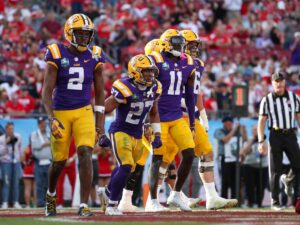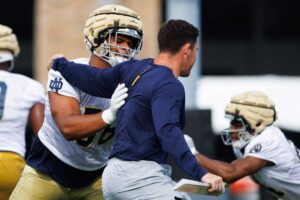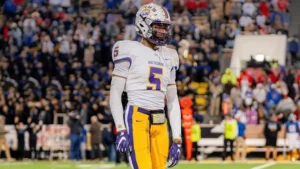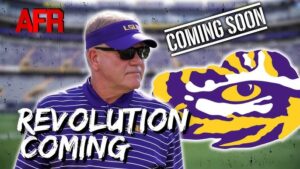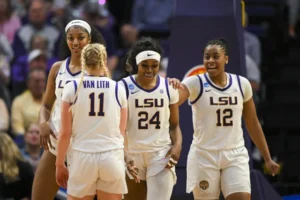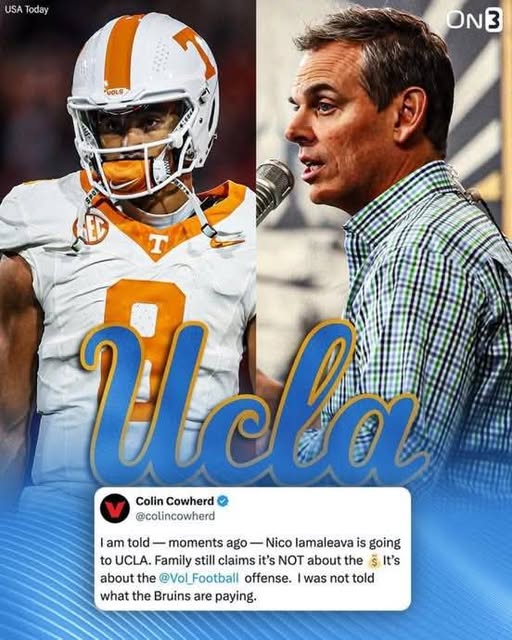
College football is undergoing a seismic shift as a result of Nico Iamaleava’s transfer to UCLA. This article examines the implications of the high-profile move, looks at NIL’s influence, and looks at the programs’ prospects going forward.
The recent transfer of quarterback Nico Iamaleava from the University of Tennessee to the University of California, Los Angeles (UCLA) has sent shockwaves through the college football landscape. This high-profile move not only highlights the increasing influence of Name, Image, and Likeness (NIL) deals but also underscores the shifting dynamics within college football programs. As Iamaleava returns to his home state of California, the implications of his transfer extend beyond his personal journey, reflecting broader trends in recruiting, program management, and the evolving role of NIL in collegiate athletics.talkSPORT+3Off Tackle Empire+3Toxigon+3
Nico Iamaleava’s Transfer: A Game-Changer
Nico Iamaleava’s decision to transfer to UCLA marks a significant turning point in college football. Originally from Long Beach, California, Iamaleava’s move back to his home state signifies more than just a change of scenery; it represents a strategic alignment with a program poised for growth and national prominence. At Tennessee, Iamaleava had an impressive tenure, leading the Volunteers to a College Football Playoff appearance and earning an $8 million NIL deal. However, reported tensions with the program over NIL compensation led to his departure. UCLA, under new head coach Deshaun Foster, offers a fresh start and a platform to further elevate his career.Reuters
The Role of NIL in Player Movement
The emergence of NIL deals has transformed the college football recruiting landscape. Athletes now have the opportunity to profit from their personal brand, leading to a more fluid and competitive environment. In Iamaleava’s case, his NIL deal at Tennessee was a significant factor in his recruitment, and the subsequent dissatisfaction with the program’s handling of his NIL opportunities influenced his decision to transfer. This scenario exemplifies how NIL deals are not merely supplementary earnings but central to an athlete’s collegiate experience and decision-making process.Toxigon+2Toxigon+2Toxigon+2Reuters
Impact on UCLA’s Program and the Big Ten Conference
UCLA’s acquisition of Iamaleava is a strategic move to bolster its football program as it transitions into the Big Ten Conference. The addition of a high-profile quarterback enhances the team’s competitiveness and national appeal. Iowa State transfer Joey Aguilar and returning senior Ethan Garbers now face increased competition, which can elevate the overall performance of the team. Moreover, Iamaleava’s presence at UCLA may attract additional talent and sponsorship opportunities, further solidifying the program’s standing in the conference.Reuters
Broader Implications for College Football
Iamaleava’s transfer underscores several broader trends in college football:
-
Increased Player Mobility: The transfer portal, coupled with NIL opportunities, has made player movement more prevalent. Athletes are now more empowered to seek programs that align with their personal and financial goals.Reuters
-
Financial Disparities Among Programs: Programs with robust NIL collectives can offer more lucrative deals, potentially attracting top talent. This creates a competitive imbalance, as schools with fewer resources may struggle to keep pace.Toxigon+1mkhustle.com+1
-
Evolving Program Strategies: Coaches and athletic departments are adapting by incorporating NIL considerations into their recruiting and retention strategies. This includes establishing compliance offices, providing financial education, and engaging with boosters to support NIL initiatives.Toxigon
Nico Iamaleava’s transfer to UCLA is emblematic of the new era in college football, where NIL deals play a pivotal role in shaping player decisions and program trajectories. As the landscape continues to evolve, the intersection of athletics, business, and personal branding will redefine what it means to be a student-athlete. For Iamaleava, this move represents an opportunity to further his career in a dynamic and supportive environment, while also reflecting the broader shifts occurring within collegiate sports.
